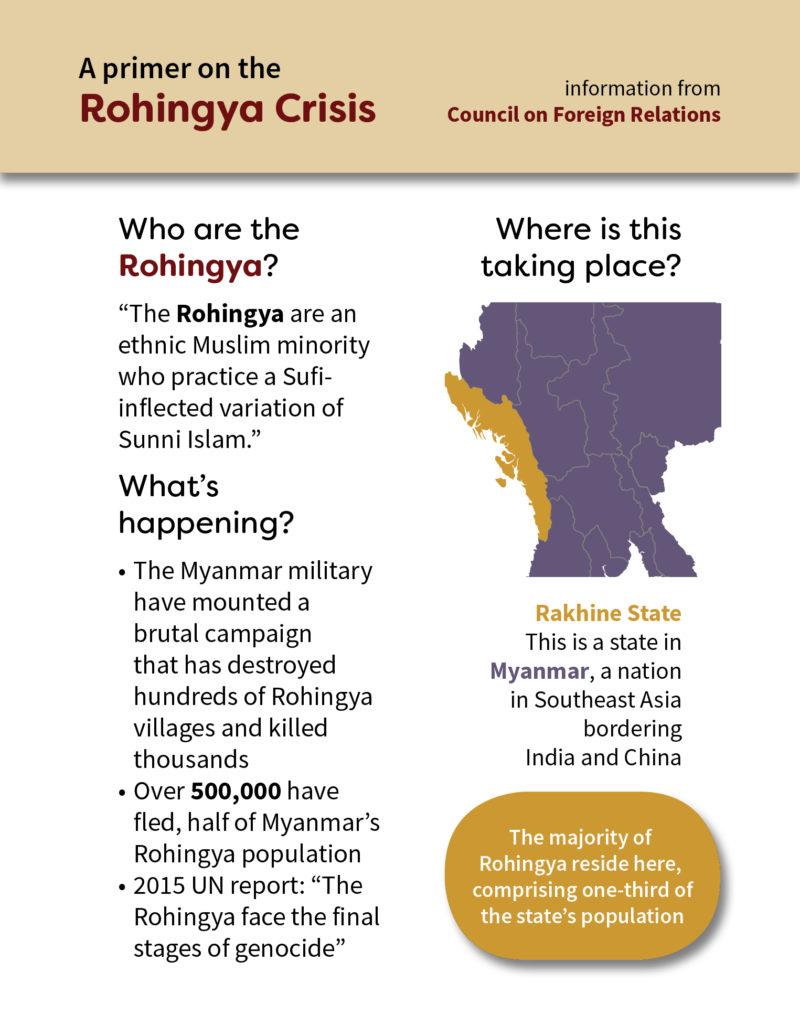The departments of philosophy, sociology and anthropology and political science are hosting a panel discussion on Thursday, Oct. 12, concerning the current crisis that Rohingya people are facing in Myanmar. Rohingya Muslims are not recognized as citizens by the Myanmar government and thus do not have many of the rights that other people in the country do. Many refugees and families of those being persecuted have sought refuge in San Antonio.
Judith Norman, philosophy professor, is organizing the panel discussion.
“I know that there is a Rohingya community in San Antonio concerned to call attention to the violence and the distress of their relatives caught up in this crisis,” Norman wrote in an email interview. “I am pleased to be able to bring this forum to Trinity so that the Trinity community can have the opportunity to hear more about the crisis that affects international politics as well as local communities and to learn how to take effective action.”
Norman explained that attending such discussions about the Rohingya crisis is important because of the impact that we can have as Americans.
“As U.S. citizens, we have a large footprint in world affairs and, accordingly, a profound responsibility to learn more about what happens in the world,” Norman wrote. “We can take action for instance by expressing our views to our political representatives, donating time and money to international humanitarian relief organizations, and working to make San Antonio a welcoming community for refugees fleeing violence.”
Habiba Noor, a First-Year Experience professor, helped Norman organize the discussion. She explained how the event came about and why it is important.
“We became aware of this because we were involved in a recent protest downtown, where many of the Rohingya folks came out,” Noor said. “We had a chance to meet some people there and so we knew that this was an issue that required some attention. Many people don’t know what’s going on, and many people don’t know that there are actually Rohingyan refugees that live in San Antonio.”
Noor highlighted the fact that many of those affected by the crisis are calling for greater recognition of the situation.
“We thought this would be a good opportunity to share some of that,” Noor said. “This is quite a dire situation, and they are desperate for attention because they feel that this is something that has gone under the radar. People here in San Antonio have family members that are living in their villages back home and they’re seeing what’s happening.”
Noor emphasized the importance of awareness about the current situation in Myanmar.
“People need to be aware of this and take some kind of action in condemning what’s happening, and kind of pressure politicians to condemn this, because those affected by the crisis believe that if the government of Myanmar feels pressured by American politicians, they may actually change their ways,” Noor said. “Imagine if this was the time of Nazi Germany, and people didn’t know that there were Jews that were being put into concentration camps. It’s like when there’s life and death that people are fearing in this particular systematic way, people just need to know that this happening to speak out. We live in a democratic society that speaking out actually has impact because the people in power can listen to their constituents and say something.”
Noor also highlighted the benefits that come from speaking about this topic at a university.
“I think that the fact that this is taking place at a university is very good, for the students to become aware,” Noor said. “It’s also a welcoming place for community members and people notice that if this is something that Trinity is doing it’s taken seriously. This kind of highlights how Trinity can actually be a place for discussions that occur beyond the classroom. I teach Social Justice and we talk about “˜othering’ and racism, and this is a form of racism that’s taking place in Myanmar that’s producing this genocide currently.”
Josephine Van Houten, sophomore international studies major, is interested in the discussion because she wants to know more about what is going on in the world.
“I hope to learn not just about this crisis but also a bit of history of Myanmar, simply because this isn’t a country we hear much about and I want to see this crisis in context rather than just a story in the news,” Van Houten wrote in an email conducted prior to the panel. “I’m interested in coming because I want to be a little more clear on what exactly is happening there. Is it ethnic cleansing? How much of it is the leader’s fault?”
Students can become more involved in taking action against the crisis by contacting Norman or Noor, [email protected] and [email protected], respectively, or by getting into contact with the International Humanitarian Crisis Initiative by emailing [email protected].







